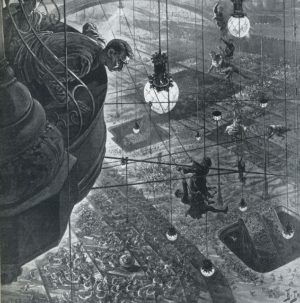You have no items in your cart. Want to get some nice things?
Go shopping The year is 2022. Israel is no more. Having been annexed by its hostile neighbouring countries, its citizens are now global refugees, many of them relocating to the States, which has subsequently become a forcing house for violent racism: everywhere Jews find they are subject to widespread verbal abuse, anti-Semitic public demonstrations and targeted murders.
The year is 2022. Israel is no more. Having been annexed by its hostile neighbouring countries, its citizens are now global refugees, many of them relocating to the States, which has subsequently become a forcing house for violent racism: everywhere Jews find they are subject to widespread verbal abuse, anti-Semitic public demonstrations and targeted murders.
Amid this tumult we encounter the three Jacobson siblings assembling in LA for Passover: Jacob, a small-beer playwright who has travelled from Berlin with Dieter, his German boyfriend; Edith, a divorced ethics professor from Atlanta currently enmeshed in a sexual harassment suit; and Moses, a failed actor best known for a starring alongside his bad-tempered wife and their five sons in a now cancelled reality TV show. All three have muddled towards a vague agreement that they will murder their father Julian – an exemplar of the bullying, sadistic patriarch who evades cliché simply by being such an extreme case – whom they suspect of plotting to quicken the demise of Roz, their meek and terminally ill mother.
Tell Me How This Ends Well is a story told via character studies, with the holiday gathering described from the point of view of each family member in turn, all of whom are coping (or struggling to cope) with the ongoing trauma that comes with simply being a Jacobson. But all are nonetheless compelled to come together in the way that only family and faith can achieve.
The dynamics of a fractured family is where Levinson’s eye is at its keenest. Jacob, the first member of the Jacobson family we encounter, ‘had thought he’d come to terms with and healed from the worst of his dad’s treachery, all those years of unwarranted hostility, by finding Diet and moving to Berlin. Unfortunately, he’d begun to realize that he’d unwittingly managed to smuggle the tyranny of his dad in through customs with him.’ Prose like this – incisive, taut, witty – helps a good deal because elsewhere this is not an easy work of fiction to traverse. There are no line breaks in the five hefty chapters, which each form one long stream of consciousness in the third person, but there is a systematic use of delayed exposition: lengthy scenes frequently only start to make sense pages and pages further down the line.
There’s something grown-up and pleasingly cavalier about this but, at the same time, for the engine of Levinson’s narrative to function correctly he relies on some decidedly creaky mechanics: characters often find themselves sitting alone in traffic jams on the freeway for long periods of time, solely in order to permit segues into lengthy elucidating flashbacks. Edith, for instance, as well as attending the family get-together, has an academic conference to attend. She thus hires a rental van and spends her allotted portion of the novel attempting to square the affection she alone feels for her father with a mounting realisation that the fond childhood memories she dwells on, when scrutinised, bring forth irrefutable proof that Julian is capable of far murkier behaviour than any of his clan hitherto imagined. It’s successful in its purpose – indeed, Edith’s section of the novel is its most enjoyable – but there’s no denying you can see the cogs at work: the conference itself is conveniently and rather abruptly absented.
The thing which separates Tell Me How This Ends Well from the hundreds or so other thoughtfully constructed middle class family portrait novels published in the US every year is its speculative fiction aspect. Levinson is due no small amount of credit for his rather eerie prescience: a dense and sprawling novel such as this must surely have begun life well before the advent of President Trump and the surge in the number of reported anti-Jewish incidents his administration has overseen.
The shifts which occurred in the wider geopolitical landscape to bring about such a disastrous state of affairs remain opaque. ‘Syria, Iran, and Lebanon had invaded, conquered, and carved up Israel,’ is pretty much the sum total of the detail. ‘They’d put up a good fight, the Israelis, but they couldn’t make a go of it alone.’ Although the collapse of Israel leads directly to violence and terror on American streets – rallies, beatings, suicide bombings – such things for the most part take place off-screen, glimpsed in characters’ inner ruminations or heard fleetingly in a car-radio news bulletin. Similarly, although set five years in the future, the technology which furnishes the lives of the wealthy and media-savvy characters is almost entirely unchanged from what we currently have. Indeed, although eye-catching, the novel’s dystopian bearing rarely develops beyond a few sketchy details, all of which the novel could easily shed while remaining structurally intact. When viewed alongside the evident attention to craft with which he has tended the novel’s family ecosystem, and how grand its subject matter is – fatherhood, faith, family – it’s hard to avoid the conclusion that Levinson perhaps didn’t want to muddy his lofty themes in the lowbrow waters of science fiction.
Which is a shame and the crux of why the novel doesn’t quite hit the mark. Tell Me How This Ends Well is a beehive of a book, swarming with interweaving characters and incidents but also with competing registers. After settling into a nuanced study of family the reader is hastily upended into a rather on-the-nose satire on reality TV culture, only to be reminded that this is a piece of serious fiction about racial identity, amid which they find the central characters locked into a wacky folie à trois caper.
Although his premise is outré and his plot bustling, Levinson is more of an elegant and careful stylist than the likes of Michael Chabon or Rick Moody and other whipcrack wise-guy writers Tell Me How This Ends Well is perhaps most reminiscent of. Although the tone of the book glows with great grace, it doesn’t quite illuminate a convincing path through its wayward clutter.
Tell Me How This Ends Well is published by Corsair. RRP £16.99.

About Richard Hirst
Richard V. Hirst is from Manchester. His writing has been featured in the Guardian, the Big Issue and Time Out, among others. His latest book is The Night Visitors, co-written with Jenn Ashworth.




